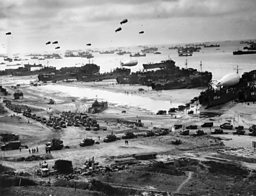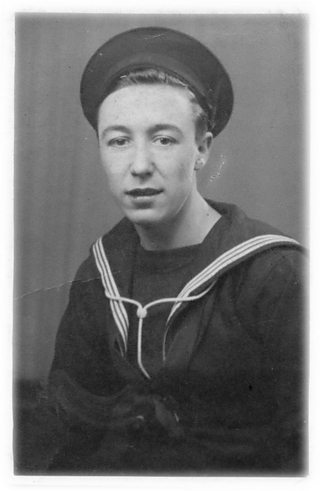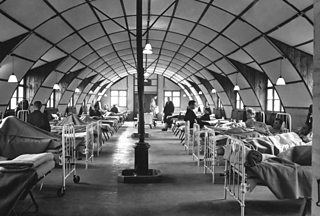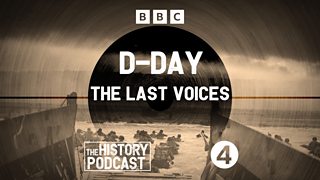‘Call the midwife’ star remembers father’s heroic D-Day role
World War Two affected millions of families around the globe. In the years that followed, some regaled their nearest and dearest with tales from the front lines. Others never spoke about the horrors.
You might know Paul McGann as the voice of Noiser’s award-winning podcast Real Dictators. And you’ll certainly recognise his brother Stephen from the hit ¥ÛœÛ¥´√Ω TV show Call The Midwife.
What you might not know is that their father Joe was one of the first British soldiers to make it ashore on D-Day.
Listen to the full story now on ¥ÛœÛ¥´√Ω Sounds.
“If you melt all of that battle for Normandy down to a few heartbeats, and a few moments, it's my father in that landing craft with bullets going above his head. Everything melts to the experience of these boys. And what they do in the next few hours is everything or nothing.”

Joe McGann was born in Liverpool in 1924, growing up in a cramped house on Upper Frederick Street. The McGanns had fled Ireland during the potato famine half a century earlier, and had been scraping by ever since.
When Joe was five years old, on Christmas day 1929, his father died of pneumonia, leaving the family destitute. Joe’s mother worked all hours as a laundress, in order to feed and clothe her three children.
Joe was a bright boy, with a love of books, and at 11 he gained a scholarship to grammar school. But the family couldn’t afford to pay for the uniform, so he had to turn it down. At 14, he dropped out of school to work on the railways.
Around the same time, war broke out. Not yet old enough to serve, Joe volunteered to help the Air Raid Precautions wardens during the Liverpool Blitz of 1940 and 1941.

His hometown suffered a brutal bombing campaign by the Luftwaffe... The worst in the country outside London.
When Joe was old enough to enlist, he decided to join the navy.
For a while, Joe worked as a telegraphist in the North Sea, tapping out coded messages to friendly ships delivering supplies to Stalin in the Arctic Circle.
“I think it was a bit of a no-brainer for him to go into the Navy. Coming from Liverpool, he was very proud of Liverpool's place in the Second World War. He'd often tell me about Liverpool's larger part in the battle of the Atlantic.”
But, when the chance came to join a submarine team, he jumped at the chance… much to the consternation of his big brother, Jimmy.

“I think it was a bit of a no-brainer for him to go into the Navy. Coming from Liverpool, he was very proud of Liverpool's place in the Second World War. He'd often tell me about Liverpool's larger part in the battle of the Atlantic”Stephen McGann
“Jimmy said to me later, long after my dad had died, ‘I knew the first thing he would do is bloody well volunteer for something! And I said to him, "Whatever you do, don't volunteer for anything. Just keep your head down. If they ask for a man to step forward, stay where you are!"
Despite his brother’s protestations, Joe eventually joined an elite unit known as the Royal Naval Beachhead Commandos. Their role was to land on an enemy beach at the start of battle and secure the site so that more soldiers and equipment could land safely. Joe’s unit was to be part of the front line.
After months of intensive training in Scotland, his unit was called upon to take part in Operation Overlord…
On June 6th, 1944… D-Day.
Their mission would be to reach the village of Arromanches-les-Bains and set up a radio signal to help coordinate the naval shelling. This would involve disembarking from a landing craft in the sea, running up an enemy beach under heavy gunfire and somehow overpowering the German defences.
Their commander described it as a suicide mission.
“My father was told he was dispensable. His first-wave attack as a commando had to succeed… even over his dead body.”
On the morning of June 6th, 1944, Joe McGann was carried across the sea from Britain to Normandy. Shells whizzed overhead, battering the French coast. Soon, the sound of gunfire reached the soldiers. So much for the element of surprise.
When the landing craft’s doors opened, further from shore than they’d hoped, the commandos rushed out. Some were pulled under the waves instantly, dragged down thanks to the weight of their packs… drowning before their boots had even touched foreign sand.
Joe made it ashore, under heavy fire from the German defences. Hiding behind a beach obstacle, he summoned his courage. With one last breath, he leapt out, zigzagging his way up the sand, taking pot shots at the enemy with his gun.
Soon, he made it to the relative safety of the beach wall. His radio was destroyed, so his primary objective could not go ahead. Instead, he joined a group of soldiers who were clearing a German defensive position.

It was here that Joe McGann was seriously injured, when a stick grenade was hurled towards his group by one of the Germans. Some of his comrades managed to get away, but Joe saw the grenade too late.
All he could do was turn his body away from it. With a deafening bang, the grenade exploded. Joe was peppered with shrapnel, puncturing his abdomen, arms and legs in fifty different places.
There was blood everywhere, and he soon drifted into unconsciousness.
When he woke up, Joe was in Leicester Royal Infirmary. A clerical error had sent him there instead of Liverpool.
But in one respect, at least, he was incredibly lucky.
If Joe’s injuries had been sustained during the First World War, he would never have survived. His life was saved thanks to a state-of-the-art medical innovation… penicillin.
“Over the next few days, the servicemen around him were witness to what they all knew was a miracle happening. He said what happened was they used to sit on each other's beds. And they looked at each other's wounds on their arms and on their legs. And the wounds would be healing…”
The penicillin worked wonders on Joe’s body. But the mental injuries he had suffered on D-Day would never fully heal.
Although Joe had done his duty with honour, the effects of the experience must have taken their toll on him afterwards. The long shadow of war affected Joe for the rest of his life.
Joe’s file was stamped with the words “Anxiety Neurosis” – what we now know as Post Traumatic Stress Disorder.
For most of his life, Joe McGann refused to talk about his experiences. It was only in his final years that he opened up to Stephen about what he went through on D-Day.
“I said to him, ‘What was that like?’ He said, and I'll never forget… He took a breath in. And he paused, and he took another breath in. He said, ‘Son, war is a terrible thing.’ And he paused, and he said, ‘A terrible, terrible thing.’ I have never forgotten the way he said that.”
To hear more incredible stories, subscribe to D-Day: The Tide Turns on ¥ÛœÛ¥´√Ω Sounds, presented by the McGann brothers. Episode 1 launched on 4th June on ¥ÛœÛ¥´√Ω Sounds and is available to listen to now.
More from ¥ÛœÛ¥´√Ω Sounds
-
![]()
D-Day: The Last Voices
Eighty years on: the story of D-Day as it unfolds, using rediscovered testimonies of those who were there, on all sides.
-
![]()
D-Day Minus
A collection of stories that give a snapshot of everyday life in Britain and France in the build-up to D-Day. Based on a story by Mike Walker.
-
![]()
Real Dictators
Real Dictators explores the hidden lives of history's tyrants. Narrated by Paul McGann.
-
![]()
History's Secret Heroes
Helena Bonham Carter shines light on extraordinary stories from World War Two.





